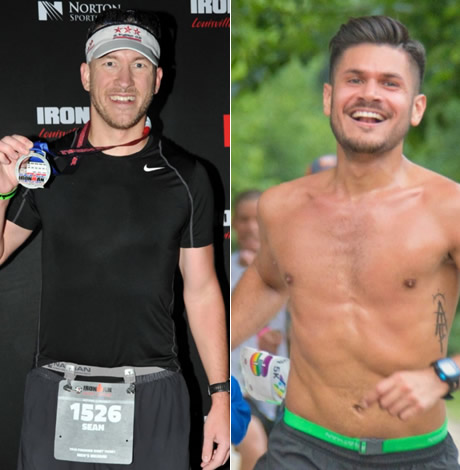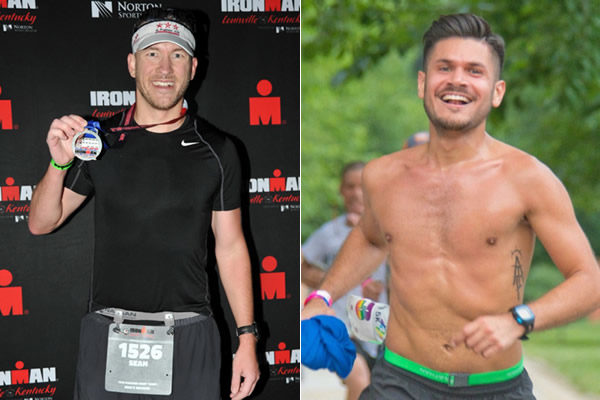Sports
Local athletes find niche in triathlon community
Sean Maloney, Jorge Alvarez shine despite not feeling particularly athletic


TriOut Multisport. is the LGBT community group under the DC Tri Club umbrella. This week in the Blade’s All Star series, we spotlight the path of two LGBT athletes who have found their niche in the triathlon community.
Like many triathletes, Sean Maloney has a list of goals. This year, he’ll compete in his third full Ironman triathlon and hopes to one day be selected for the Kona Ironman World Championship through its Ironman Legacy Program.
He also wants to run a full marathon on all seven continents. Even though he’s marking off sports achievements that many people only dream about, he still says he is not athletic.
“I don’t feel any more athletic now than when I started doing triathlons,” Maloney says. “When I think of athleticism, I think of talent and coordination. I am just a normal guy.”
As a kid in Corning, N.Y., Maloney’s father pushed him to try sports, but none of them stayed with him. He spent two years on the tennis team in high school but says he was more interested in a less rigid sense of masculinity and just being himself.
While attending Binghamton University, he began running at a nearby nature reserve and continued through his graduate work at Syracuse University. After working as a clinical social worker at an LGBT community center in rural Pennsylvania, Maloney moved to D.C. in 2010.
He was only running up to three miles at the time when a spin instructor asked him to run the Annapolis Ten Mile Run. It was his launching pad race and he goes back every year to participate and mark the spot where he got started.
Maloney’s first triathlon was the Carolina Beach Double Sprint in 2014 and there were many lessons along the way.
“I signed up at the YMCA for swim training and couldn’t make it past 12 yards at my first session. When I saw the five-foot swells at the triathlon, I had a panic attack. I didn’t even know how to get past the breakers,” Maloney says. “After I completed the race, the feeling of accomplishment was totally novel to me. It was different and addicting. I did two more triathlons that year including the Cleveland Gay Games.”
Maloney, who works as director of development at Women for Women International, returned to the Gay Games in Paris last year to run the full marathon. Coming up he will be doing the Geneva Musselman sprint triathlon with his father and twin sister, and then completing the half Ironman the next day on his own.
“The triathlon community has given me so much. There are built-in training partners that help you cut through the noise,” Maloney says. “I have found my best friend, a sense of community and a sense of self.”
Jorge Alvarez discovered something in the triathlon community that he didn’t know was inside of him: a competitive sports spirit. Growing up in Venezuela and the United Kingdom, there was a small amount of swimming and tennis, but most of his focus was on playing cello.
His music kept him busy, but he put aside time for running and biking while attending Shepherd University. After moving to D.C. in 2013, he began dating a runner, ran a few 5Ks and then went right for a longer distance taking on the Marine Corps Marathon.
“Running long distances was starting to hurt my knees and I ended up splitting from my boyfriend,” Alvarez says. “I was in a dark place and I needed something positive to keep me busy.”
Alvarez started training on his own for a triathlon and completed his first sprint at the Nation’s Triathlon in 2017. He was hooked and joined TriOut Multisport for race and nutrition advice before moving forward to compete in more triathlons.
“My competitive drive kicked in after that first race when I realized that sports were helping me stay out of that dark place,” Alvarez says. “I love all of it — the discipline, the research, the dedication. It fulfills me and makes me happy.”
Alvarez has many things keeping him busy outside of triathlon training. Along with working as an accountant at a nonprofit, he plays cello with NIH Philharmonia, teaches music to youth and has played in Stonewall Kickball.
And like all competitive athletes, he has sports goals.
“I am aiming to complete a half Ironman this year and would like to try and make the elite team with DC Tri,” he says. “I am proud to be dedicated to my racing. If you work really hard, you can get to a better place.”

More than a dozen LGBTQ athletes won medals at the Milan Cortina Winter Olympics that ended on Sunday.
Cayla Barnes, Hilary Knight, and Alex Carpenter are LGBTQ members of the U.S. women’s hockey team that won a gold medal after they defeated Canada in overtime. Knight the day before the Feb. 19 match proposed to her girlfriend, Brittany Bowe, an Olympic speed skater.
French ice dancer Guillaume Cizeron, who is gay, and his partner Laurence Fournier Beaudry won gold. American alpine skier Breezy Johnson, who is bisexual, won gold in the women’s downhill. Amber Glenn, who identifies as bisexual and pansexual, was part of the American figure skating team that won gold in the team event.
Swiss freestyle skier Mathilde Gremaud, who is in a relationship with Vali Höll, an Austrian mountain biker, won gold in women’s freeski slopestyle.
Bruce Mouat, who is the captain of the British curling team that won a silver medal, is gay. Six members of the Canadian women’s hockey team — Emily Clark, Erin Ambrose, Emerance Maschmeyer, Brianne Jenner, Laura Stacey, and Marie-Philip Poulin — that won silver are LGBTQ.
Swedish freestyle skier Sandra Naeslund, who is a lesbian, won a bronze medal in ski cross.
Belgian speed skater Tineke den Dulk, who is bisexual, was part of her country’s mixed 2000-meter relay that won bronze. Canadian ice dancer Paul Poirier, who is gay, and his partner, Piper Gilles, won bronze.
Laura Zimmermann, who is queer, is a member of the Swiss women’s hockey team that won bronze when they defeated Sweden.
Outsports.com notes all of the LGBTQ Olympians who competed at the games and who medaled.
Sports
US wins Olympic gold medal in women’s hockey
Team captain Hilary Knight proposed to girlfriend on Wednesday

The U.S. women’s hockey team on Thursday won a gold medal at the Milan Cortina Winter Olympics.
Team USA defeated Canada 2-1 in overtime. The game took place a day after Team USA captain Hilary Knight proposed to her girlfriend, Brittany Bowe, an Olympic speed skater.
Cayla Barnes and Alex Carpenter — Knight’s teammates — are also LGBTQ. They are among the more than 40 openly LGBTQ athletes who are competing in the games.
The Olympics will end on Sunday.
Sports
Attitude! French ice dancers nail ‘Vogue’ routine
Cizeron and Fournier Beaudry strike a pose in memorable Olympics performance

Madonna’s presence is being felt at the Olympic Games in Italy.
Guillaume Cizeron and his rhythm ice dancing partner Laurence Fournier Beaudry of France performed a flawless skate to Madonna’s “Vogue” and “Rescue Me” on Monday.
The duo scored an impressive 90.18 for their effort, the best score of the night.
“We’ve been working hard the whole season to get over 90, so it was nice to see the score on the screen,” Fournier Beaudry told Olympics.com. “But first of all, just coming out off the ice, we were very happy about what we delivered and the pleasure we had out there. With the energy of the crowd, it was really amazing.”
Watch the routine on YouTube here.
-

 Mexico5 days ago
Mexico5 days agoUS Embassy in Mexico issues shelter in place order for Puerto Vallarta
-

 Real Estate5 days ago
Real Estate5 days ago2026: prices, pace, and winter weather
-

 Theater5 days ago
Theater5 days agoJosé Zayas brings ‘The House of Bernarda Alba’ to GALA Hispanic Theatre
-

 Netherlands4 days ago
Netherlands4 days agoRob Jetten becomes first gay Dutch prime minister















